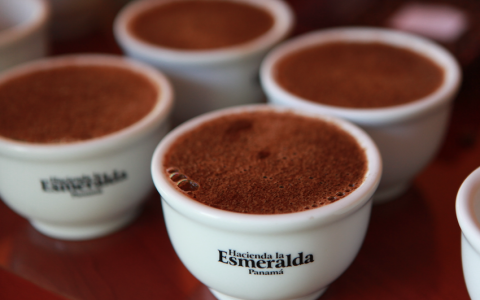
Coffee roaster Mike Perry used to be a chemical engineer, so he appreciates how much science goes into a good cup of coffee.
For one, you really need a kitchen scale to measure out the precise proportion of ground beans to water. And the water really has to be added in three parts, in stopwatch-timed intervals. I could go on. But the point is: The man knows his coffee.
So if you're going to trust anyone to sell you a cup that costs $55, he's a good bet.
Starting November 18, Perry's roastery in Southern California will be the only shop in the U.S. to offer a bean that gets baristas' aprons in a bunch: Esmeralda Geisha 601, from a small farm in Panama. Perry persisted through more than 250 bids in a 5-hour coffee auction to win 11 pounds of the beans for his Klatch Coffee shop in Rancho Cucamonga. He paid $601 per pound.
His bounty is enough to make 250 eight-ounce cups, available for $55 each in Klatch's tasting room, about 40 miles east of downtown Los Angeles.
The obvious question: What could make a cup of coffee worth $55?
Before you say "nothing," Perry urges skeptics to consider how much they would shell out for a hard-to-find wine or spirit. A coffee farm's harvest is just as involved as a winery's, he says.
And "just like with wines, coffee can vary year to year—and this year was a fabulous year [for the Geisha 601]," Perry says.
"It’s just an explosion of flavors," he continues.
"You get a ton of fruit notes: strawberry and blueberry and blackberry, and the stone fruit from the peach. You kind of really can’t believe it’s just coffee—you think it's spiked with something. But it’s not."
The Geisha bean's natural fruit flavors are amplified by what Perry calls "natural processing." Coffee beans are the seeds of a cherry-like fruit; workers at Hacienda La Esmeralda, the farm that grows the lusted-after 601, let the small red fruit dry on a sunny concrete patio for eight days before removing the beans, which concentrates the flavor.
The upcoming tastings at Rancho Cucamonga are ticketed; $55 gets you eight ounces of the 601 and a mug to take home, or scale up to a $70 or $95 package to add on cups of other lauded coffees from Panama.
If you can't make it to Southern California, Perry will ship you the unground beans. Just do him a favor and use a burr grinder, which crushes more uniformly than a blade grinder; make the cup with bottled water if you don't have a kick-butt filtration system in place; and follow the brewing instructions carefully.
And, at risk of sounding obvious, leave the sweeteners out of this. "This coffee has no bitterness," Perry says. "It needs no sugar. It needs no cream."



